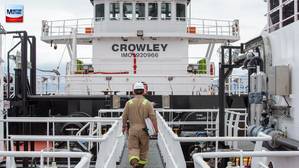Commerce Secretary William M. Daley has decided to let stand an earlier Commerce Department ruling in support of the state of North Carolina's objections to exploratory drilling off the state's coast. Mobil Exploration & Producing U. S., Inc., requested that the administrative records on their appeal of the North Carolina objections be reopened so they could include two studies the company felt would address issues relevant to the case.
The rulings and appeals are connected with "consistency" provisions of the Coastal Zone Management Act. Under the CZMA, all activities conducted or authorized by federal agencies within a participating state's coastal zone must be consistent with applicable state enforceable policies. When a state objects to a proposed project that is federally licensed, the applicant may appeal to the Secretary of Commerce to override the state's objection. The Secretary of Commerce reviews the proposed project to determine whether it is consistent with the purposes of the CZMA or of such high national interest that it is exempt from state objections. CZMA is administered by the Commerce Department's National Oceanic and Atmospheric Administration, National Ocean Service.
The case involves the company's plans to drill exploratory wells some 38 miles off the North Carolina coast in and area known as "The Point," an area important to the local fishing industry, and lease blocks known as the Manteo leases.
The Mobil-North Carolina matter goes back more than 10 years. North Carolina objected to the company's plans in 1990, preventing any drilling. Mobil then appealed to the Secretary of Commerce. Commerce closed the administrative record on the appeal on June 18, 1991. The records were reopened at the state's request on April 29, 1992, and remained open for one month, as agreed by Mobil and the state, and the company submitted a Supplemental Final Statement.
On Sept. 2, 1994, the late Commerce Secretary Ronald Brown issued a decision on the appeal declining to override objections by the state. Mobil later challenged the decision in federal court. In March of 1996 the court decided not to rule in the case and sent the matter back to the Commerce Department to determine if the administrative record should be reopened to receive the two studies from Mobil, one on the impacts of Mobil's proposed operations on benthic resources, and another on socioeconomic resources.
Signed on Dec. 8, 1999, Daley's latest decision not to reopen the records of the case in effect lets the previous decision stand. Among the reasons cited in the latest decision were:
o Timeliness. The two studies were completed in March and September of 1993, long after the records were closed in May 1992.
o Insufficient information. Even if the two studies were allowed into the record, they only address two of six information gaps identified in the 1994 decision.
o Finality in the appeals and decision process. The administrative record in this case had been opened twice to allow for additional information, and that before the records closed in May 1992 no requests to hold the record open for pending research relevant to the case was received from Mobil, North Carolina, or any federal agency.
April 2025
 Read the Magazine
Read the Magazine

 Read the Magazine
Read the Magazine
This issue sponsored by:

Looking Back: U.S. Maritime Industry Steps Up in Wake of FSK Bridge Collapse
Subscribe for
Maritime Reporter E-News
Maritime Reporter E-News is the maritime industry's largest circulation and most authoritative ENews Service, delivered to your Email five times per week












